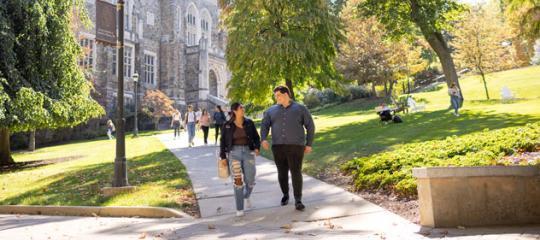Everyone knows how important early language literacy is for preschoolers. As it turns out, early math literacy may be just as vital to future success. Recent studies indicate that establishing a strong base in mathematical literacy can greatly boost a child’s cognitive capabilities, problem-solving skills, and overall academic achievements.
But how can early learning teachers assess preschoolers’ math abilities in a fun, engaging way and use that information with their students? That’s the issue Robin Hojnoski, professor of school psychology and associate dean for graduate studies in Lehigh’s College of Education, and a team of researchers are working to solve.
 Hojnoski's fellow researchers are from Purdue University, the University of Washington, and the University of California-Davis. Their project, fueled by a $1.4 million grant received in 2020, is called Links to Learning: Adaptive Math Assessment or LLAMA for short. It’s a device-agnostic app that provides a way to identify where children need early math support so they enter kindergarten with the skills needed for learning success.
Hojnoski's fellow researchers are from Purdue University, the University of Washington, and the University of California-Davis. Their project, fueled by a $1.4 million grant received in 2020, is called Links to Learning: Adaptive Math Assessment or LLAMA for short. It’s a device-agnostic app that provides a way to identify where children need early math support so they enter kindergarten with the skills needed for learning success.
“LLAMA isn’t just a tool that says, ‘This child has high-level math skills, and this child doesn’t,’” Hojnoski explains. “It’s intended to be used to inform instruction. It will help teachers determine what kids already know and how to instruct them so they develop the skills needed to reach that next level. It’s a tool built on learning pathways to inform what’s happening in the classroom.”
To assess math skills, LLAMA engages children in fun tasks related to numbers and counting, shape and spatial knowledge, measurement, patterns, and pre-algebraic thinking. Settings for the assessment include entertaining locations like the rainforest, undersea, and outer space.
“Math literacy is a strong predictor of long-term achievement, even as far out as high school,” Hojnoski says. “If you watch kids in an early childhood setting, they’re already doing complicated thinking — learning to problem-solve and interact with their environment. When they’re building with blocks, for example, they’re exploring three-dimensional shapes and how they fit together using measurement attributes. What LLAMA encourages is being more strategic about the math that’s embedded in what preschoolers already do.”
The LLAMA team hopes to have a product available to offer early childhood communities by July 2025. Hojnoski has been conducting local research and getting input and user feedback from educators and families at Community Services for Children and Lehigh Valley Children’s Centers.
“We’ve involved teachers at each stage of the development of LLAMA since they’re ultimately our end user,” Hojnoski says. “They’ve given us valuable feedback about what works and what doesn’t. The teachers, children, and parents have been great partners in our research.”
One of the team’s goals is to make LLAMA culturally fair to achieve equitable outcomes. “We tried to choose novel contexts for the assessment so that a child that gets to go to the grocery store with his parents, for example, isn’t at an advantage over a child who doesn’t,” Hojnoski says. “Right now, LLAMA is only available in English. So one of our next steps is to provide the tool in multiple languages.”
LLAMA won’t just tell teachers about a child’s math skills but will help them figure out what to do about them. “If LLAMA tells a teacher, ‘This is where you need to go next,’ we want to develop supportive activities so they can help that child move to the next level. Our ultimate goal is to impact what’s happening in early childhood programs.”
Discover More
Connect With the Lehigh Community

Join Lehigh Connects
Unlock the power of the entire Lehigh alumni network on Lehigh Connects for mentorship, career growth, job opportunities, and more.